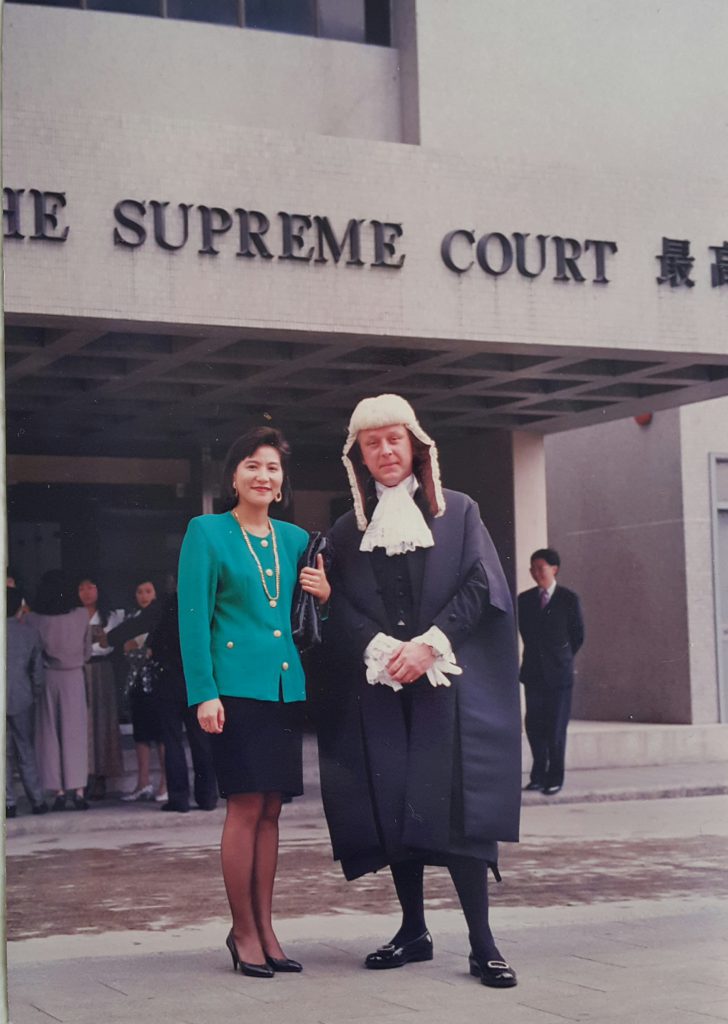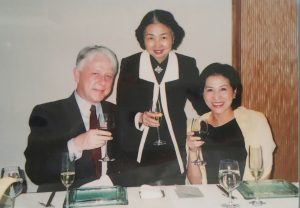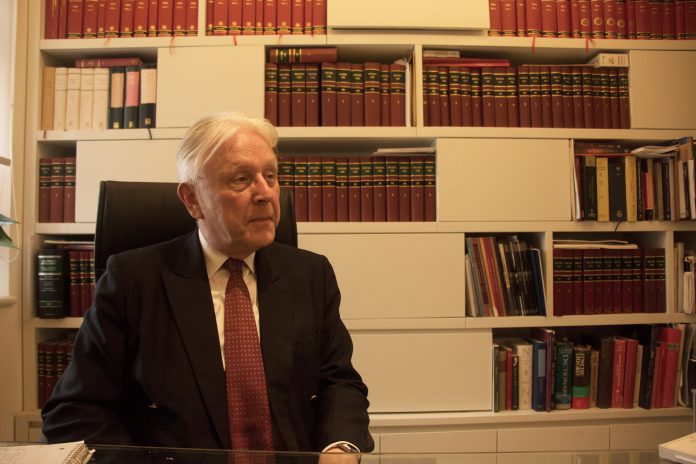Hong Kong’s first post-handover Director of Public Prosecutions calls for an improved prosecutions system
By Angela Siu
When Grenville Cross left his job as an in-house prosecutor at the Customs and Excise Department in Britain to take a job in Hong Kong in 1978, he asked his employers to hold his post. They waited two and a half years, and then another two and a half years. But not only did Cross not return to the UK, he encouraged his colleagues to come and join him in the then British colony.
Today, 65-year-old Cross considers Hong Kong his home. He is a local history buff and enthusiastically shows off his collections of old Hong Kong memorabilia and Chinese antiques. Cross is especially proud of a full set of hat knobs denoting the different ranks of late Qing dynasty officials – from ruby for the first rank to gold for the ninth.

It has been a long journey for the boy from Lincolnshire, England who became Hong Kong’s first post-handover director of public prosecutions (DPP) in 1997.
He has been keen on history and collecting old things since he was at school and had thought about becoming a historian. But he decided that did not present many career opportunities apart from teaching, which was not what he aspired to do and, instead, chose to study law at the University of Southampton.
His interest in law developed in secondary school where he chaired the Debating Society. He enjoys debating, exchanging ideas, and persuading people, which are the common characteristics of a lawyer.
After two years in private practice as a barrister, Cross joined the Customs and Excise Department in 1976. While working there, he saw an article in The Times recruiting prosecutors to work in Hong Kong. Seeing it as a good opportunity to travel and gain work experience, he applied for the job which would completely change his life.
Cross came to Hong Kong to work as a Crown Counsel at the Attorney General’s Chambers (the former Department of Justice, DOJ) at the age of 27. Beyond his expectations, he started working on jury trials in a year and dealt with his first murder case within two years.

“It was unheard of in England to do a murder trial when you were still in your twenties. You had to wait probably until in your forties,” Cross says. “So from doing very minor cases in England, I came out here and [was] suddenly doing very important cases.”
All these experiences and opportunities made Cross reluctant to return to Britain. He worked as a prosecutor for 13 years before becoming a deputy DPP in 1991. He applied for the DPP position three years later, but was turned down due to the colonial government’s localisation policy, which reserved senior positions for local Chinese. The job was given to Peter Nguyen instead.
As a “consolation prize”, Cross was offered a judgeship at the High Court. Cross considered it but decided that he preferred to argue cases and take decisions on whether to prosecute. Being a judge would also have meant being circumspect and not advocating for things he feels strongly about, such as children’s rights. So he rejected the offer and continued being a deputy DPP. “Sadly it wasn’t really for me, even though it would have been very attractive in terms of money and security,” he says.
Cross did not lose faith and chose to stay in Hong Kong even though many Hong Kong people emigrated before the handover. “I’ve been here for so many years, and this is my home,” he says. “I wanted Hong Kong to succeed after the British had left, and if everyone left at the same time, then it wouldn’t be good for the Department of Justice.”
He waited until Peter Nguyen left the office of the DPP for a judgeship in 1997 and applied for the job again. This time the post-handover government approved his appointment and he became the first DPP for the HKSAR government. “You never know in life how things are going to turn out,” he says. “So even when things look very bad, you have to keep going, and they can turn out as the best.”
Cross says it was a great honour but also a challenge to take up the job shortly after the transfer of sovereignty. To ensure a smooth transition, he initiated many reforms to modernise the system of public prosecution and safeguard the rule of law. For example, he developed areas of expertise within the department on areas such as computer crime and human rights. He also facilitated Hong Kong’s membership of the International Association of Prosecutors (IAP) to forge closer ties with prosecutors around the world.
Seeing the importance of maintaining transparency during a time of uncertainty, Cross introduced an annual report by the Department of Justice that explains the guidelines and criteria applied to prosecutions for the media and the public. With the implementation of the reforms, Cross says the legal system has grown from strength to strength and he believes the fact that many people who emigrated in the 1990s came back to Hong Kong is proof of this.
As the longest serving DPP, Cross dealt with many controversial cases, one of which came to be known as “Lexusgate”. It refers to a controversy in 2003 when the then financial secretary, Antony Leung Kam-chung bought a new luxury vehicle weeks before he announced an increase in the Motor Vehicles First Registration Tax in his budget. Leung had failed to declare his purchase.
Cross recalls he had to handle the case very carefully and asked for outside legal advice. Despite public sentiment, he says he chose not to prosecute Leung because the evidence was not strong enough. “Prosecutors are gatekeepers and they have to make sure that people are only prosecuted if there is a proper basis,” he says. To defuse any misunderstanding that prosecutors were covering up for Leung, Cross arranged a press conference and attended the Legislative Council to explain the reasons for not prosecuting.
After serving as the DPP for 12 years, Cross stepped down in 2009 but he has not retired quietly and maintains an active interest in the prosecutions field. He is the vice-chairman of the senate of the IAP and mainly works for its Standing Committee on Prosecutors in Difficulty, which gives advice and assistance to prosecutors from around the world on request.

Cross is also involved in teaching as he finds it fulfilling. He is currently a visiting professor at four universities in Hong Kong, Beijing and Wuhan where he gives lectures on Hong Kong’s criminal procedure, the operation of its legal system and the common law system. He says he likes to share his knowledge and exchanges ideas with students because they sometimes suggest new perspectives.
Besides lecturing, he edits criminal law books including Archbold Hong Kong and Sentencing in Hong Kong for criminal lawyers, judges and magistrates to use in the courts of Hong Kong. He also writes for newspaper columns where he advocates for changes in the law and occasionally offers forthright criticisms of the current state of public prosecutions and law reform.
Mostly, he is critical about the serious delays that take place in the Law Reform Commission and in the prosecutions system. He says the commission is very slow in its handling of newly proposed laws and this may make Hong Kong fall behind other countries. For instance, it took eight years to finish a report on admitting hearsay evidence in criminal cases in 2009, but Cross says the nothing has been released since then.
Cross also says it was “astonishing” for prosecutors to take three years and eight months to investigate former chief executive Donald Tsang Yam-kuen’s misconduct in public office for failing to disclose a conflict of interest.
“Justice delayed is justice denied,” Cross says. He says that as time passes, it becomes hard to find witnesses to present in court and those that do appear may not remember past details clearly.
He sees an urgent need to improve the standards of prosecution, pointing out that the conviction rate in the magistrates’ courts is constantly low at around 50 per cent, and that failed prosecutions cost the DOJ around HK$134 million from 2011 to 2015. He attributes this to the DOJ’s 2008 decision to stop recruiting new court prosecutors who have more experience in magistrates’ court prosecutions. Instead the department briefed out their work to newly qualified lawyers from the private sector so that they could “get some training at the start of their careers,” says Cross.
Hong Kong has experienced significant political events after Cross left office, including the Umbrella Movement in 2014, the Mongkok disturbances in 2015, last year’s Legislative Council “oathgate” controversy, former chief executive Donald Tsang’s corruption case and the controversy over chief executive Leung Chun-ying’s HK$50 million UGL deal.
Tackling these politically sensitive cases adds to the pressure on public prosecutors and while Cross says he believes the DOJ makes decisions on prosecutions objectively based on its guidelines, he thinks an independent prosecution system is needed.
Currently, the Prosecutions Division is headed by the Secretary of Justice, a government minister appointed by and answerable to the Chief Executive, who has ultimate say on prosecution decisions. Cross has been campaigning for the Secretary of Justice to “disengage” from prosecutions and leave those decisions to an independent DPP, a civil servant without political encumbrances. Cross believes this would help to restore much-needed public trust and confidence in the criminal justice system. However, he says it is a difficult cause to pursue because the DOJ keeps blocking attempts to establish an independent DPP without rationalising its actions.
He also says that there is now less transparency in public prosecutions than during his time, even though transparency is more important than ever given the increasing number of politically sensitive cases.
Cross says the DOJ has failed to explain the unreasonable delays in prosecuting many cases, including those related to the Umbrella Movement, the Donald Tsang case and also deciding whether Leung Chun-ying has a case to answer. He points out the DOJ disbanded its Vulnerable Witness Team in 2010 – established in the 1990s to tackle cases involving underage and mentally disabled victims. But this was only discovered last November and the DOJ did not inform or consult the police and non-governmental organisations beforehand.
He hopes the trend can be reversed. “Transparency is not something for prosecutors to fear as it can actually strengthen their position in the community and blows away myths and misunderstandings,” says Cross.
Edited by Venice Lai











































